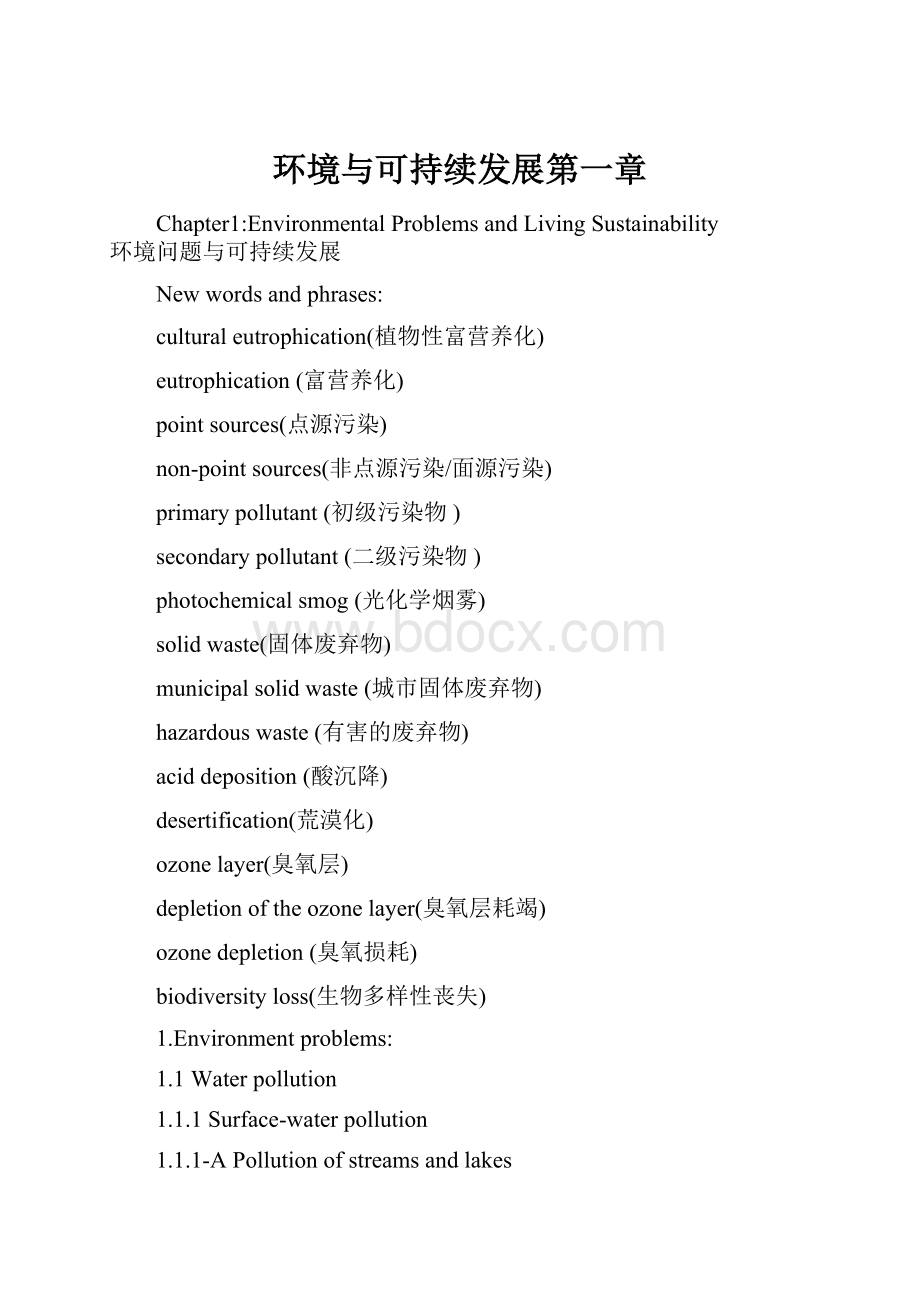环境与可持续发展第一章.docx
《环境与可持续发展第一章.docx》由会员分享,可在线阅读,更多相关《环境与可持续发展第一章.docx(13页珍藏版)》请在冰豆网上搜索。

环境与可持续发展第一章
Chapter1:
EnvironmentalProblemsandLivingSustainability
环境问题与可持续发展
Newwordsandphrases:
culturaleutrophication(植物性富营养化)
eutrophication(富营养化)
pointsources(点源污染)
non-pointsources(非点源污染/面源污染)
primarypollutant(初级污染物)
secondarypollutant(二级污染物)
photochemicalsmog(光化学烟雾)
solidwaste(固体废弃物)
municipalsolidwaste(城市固体废弃物)
hazardouswaste(有害的废弃物)
aciddeposition(酸沉降)
desertification(荒漠化)
ozonelayer(臭氧层)
depletionoftheozonelayer(臭氧层耗竭)
ozonedepletion(臭氧损耗)
biodiversityloss(生物多样性丧失)
1.Environmentproblems:
1.1Waterpollution
1.1.1Surface-waterpollution
1.1.1-APollutionofstreamsandlakes
Aslongastheyarenotoverloaded(负荷过载),flowingbodiesofwater(流动水体)canrecoverrapidlyfromdegradable(可降解的),oxygen-reducing(耗氧)wastesandexcess(过量的)heatthroughacombinationofdilution(稀释)andbacterialdecay(细菌腐化).Water-pollutioncontrollawshaveimprovedwaterqualityofstreamsinmostdevelopedcountries,butstream-waterqualityinmostdevelopingcountriesispoor.
只要流动水体负载的可降解废弃物、耗氧废弃物、热能没有过量,就可以通过稀释、细菌分解等作用下快速恢复。
很多发达国家已经通过水污染控制条例来提高了河流的水质,但在很多发展中国家,河流水质仍旧不达标。
Lakesandpondsaremorevulnerable(脆弱)thanstreamstopollutionbecausetheyhavelittleflow.Culturaleutrophication(植物富营养化)threatensmanylakesandpondsinurbanandagriculturalareas.
由于流动性很差,湖泊、池塘等比河流更容易被污染。
在城市和农业地区,很多湖泊和池塘都受到了植物富营养化的威胁。
1.1.1-BPollutionofocean
Howmuchpollutioncantheoceanstolerate(承受)?
海洋可以容纳多少污染物?
Theoceanscanabsorbhugeamountsofwastematter,butmanycoastalareas(沿海地区)havebecomecontaminated(受污染).Runoff(径流)ofsewage(污水)andagriculturalwasteandaciddepositionfromtheatmospherecancauseharmfulalgalblooms(有害藻类激增).Deathanddecayofalgacancauseoxygen-depleted(氧气殆尽)zones.
海洋可以吸收大量的污染物,但很多沿海地区还是受到了污染。
下水道污水排放、农业废水、大气酸沉降会导致有害藻类激增。
藻类的死亡和衰竭也会造成氧气耗竭的区域。
Oceandumping(倾泻)ofdredgespolis(下水道沉积物),sludge(烂泥),anddebris(残骸)threatensmarineorganisms(海洋生物).Offshoreoilwells(近海油井),washingoiltankers(油轮),pipeline(输油管)andstoragetankleaks(泄漏),andtankeraccidentsreleasepetroleum(石油)productsintotheocean.Mostmarinelifecanrecoverfromexposure(暴露)tocrudeoil(原油)within3years,butexposuretorefinedoil(精炼油)cantake10yearsorlonger.Avarietyofmethodsareusedtocleanupspills(漏损),butnoneworkwellonalargespill.
向海洋倾倒下水道沉积物、淤泥、垃圾的行为威胁到了海洋生物。
近海油井的开采、油轮的清洗、输油管和储油罐的泄露以及意外事故会排放很多原油产物进入海洋。
很多海洋生物可以在3年时间内从原油污染的情况下恢复回来,但如果是精炼油污染,则可能耗费10年甚至更久。
有很多方法可以处理石油泄漏问题,但对于大规模的泄漏情况,目前还没有有效的解决措施。
1.1.1-CEutrophication
Eutrophication(富营养化)
Physical,chemical,andbiologicalchangesthattakeplaceafteralake,estuary(河口),orslow-flowingstreamreceivesinputsofplantnutrients--mostlynitrates(硝酸盐)andphosphates(磷酸盐)--fromnaturalerosion(腐蚀)andrunofffromthesurroundinglandbasin(流域)。
湖泊、河口或者流速缓慢的河流通过自然腐蚀和地表径流被投入一定量的植物所需的营养物质——多数为硝酸盐和磷酸盐——所发生的物理、化学、生物层面的变化。
Culturaleutrophication(植物性富营养化)
Over-nourishment(养料过量)ofaquatic(水生的)ecosystemswithplantnutrients(mostlynitratesandphosphates)becauseofhumanactivitiessuchasagriculture,urbanization,anddischargesfromindustrialplantsandsewagetreatmentplants(污水处理厂).
由于农业灌溉、城市废水、工业废水和污水处理厂废水排放等人类活动所导致的水生系统中植物性营养物质(N、P等)过量。
1.1.1-DSolutions:
Preventingandreducingsurface-waterpollution
处理措施:
预防和减少地表水污染
Therehasbeenlittleimprovementinreducingpollutionfromnonpointsources.However,theCleanWaterActhasledtoimprovementsinU.S.waterqualitybyreducinginputsfrompointsources.Thereiscontroversy(争论)overwhethertheactshouldbeweakenedorstrengthened.
虽然在减少面源污染的措施上没有显著的改进,但是美国的清洁水资源行动已经通过减少点源污染而提高了水质。
Septictanks(化粪池)areusedtotreatsewagewastesfromhousesinareasnotservedbymunicipalsewers(市政下水道)andwastetreatmentplants.
化粪池专门处理那些处于市政下水道和污水处理厂覆盖范围之外的住宅污水。
Mosturbanwatertreatmentplantscarryoutprimarysewagetreatment(初级污水处理)andsecondarysewagetreatment(二级污水处理).Afewplantsalsocarryoutmorethorough(彻底的)andexpensiveadvancedsewagetreatment.Morethanhalfofthesewagesludge(污水污泥)producedintheUnitedStatesisdumpedinlandfills(填埋入地).Thereisgrowingcontroversyoverusingcontaminatedsewagesludge(污水污泥)tofertilize(施肥)foodcropsintheUnitedStates.
多数城市污水处理厂都会进行初级污水处理和二级污水处理。
小部分污水处理厂也会进行彻底但昂贵的先进处理措施。
在美国,过半的污水处理厂会将产生的污泥填埋入地。
现在,关于是否应该用被污染的污泥来施肥的争议也越演越烈。
Newmethodsoftreatingwastewaterbyworkingwithnatureincludeecologicalsystemsinwhichwateriscleanedupbypassingitthroughtankscontainingcleansing(有去污作用的)organismsorthroughnaturalorartificialwetlands(人工湿地).
将污水通入装满具有去污能力的微生物的天然或人工的湿地来达到净水效果,是通过自然力量来净化污水的方法之一。
1.1.2Ground-waterpollution地下水污染
GroundwatersuppliesabouthalfthedrinkingwaterintheUnitedStates.Itcantakehundredstothousandsofyearsforgroundwatertoclean(清洗)itselfofdegradable(可降解的)wastes,andnondegradable(不可降解的)wastesaretherepermanently(永久的).Landfills(垃圾填埋地),undergroundtanks,industrialwasteponds,andagriculturalareasaresourcesofgroundwaterpollution.
美国过半的饮用水都由地下水提供。
对于可降解的污染物,地下水要经过成百上千年的时间才能实现自我净化,对于不可降解的污染物,则是永久的。
土地填埋,工业废弃的水池和农业地区都是地下水污染的污染源。
1.1.3Pointsourceandnon-pointsource
Pointsources(点源污染)
Singleidentifiablesourcethatdischarges(排放)pollutantsintotheenvironment.Examplesarethe
(1)smokestack(烟囱)ofapowerplantoranindustrialplant,
(2)drainpipe(排水管)ofameatpackingplant(肉类加工厂),(3)chimney(烟囱)ofahouse,or(4)exhaustpipe(排气管)ofanautomobile.Comparenonpointsource.
向环境排放污染物的单一的、可识别的污染源。
例子如下:
1.火力发电站或工厂的烟囱。
2.肉类加工厂的排水管。
3.住宅的烟囱。
4.汽车的排气管等等。
Non-pointsources(非点源污染/面源污染)
Largeordispersed(分散的)landareassuchascropfields(农田),streets,andlawns(草地)thatdischargepollutantsintotheenvironmentoveralargearea.Comparepointsource.
诸如农田、街道、草地等大范围排放污染物的大量的或者分散的地区,
Pollutantsfrompointsourcesareeasytoidentify,monitor(监控),andregulate(调节、控制).Itismoredifficulttocontrolpollutantsfromnon-pointsources.
点源污染的污染物易于识别,监控和调节,但是面源污染就比较困难。
1.2Airpollution
1.2.1Outdoorairpollution(室外大气污染)
1.2.1-APrimarypollutantsandsecondarypollutants
Primarypollutant(初级污染物)
Chemicalthathasbeenaddeddirectlytotheairbynaturaleventsorhumanactivitiesandoccursinaharmfulconcentration(浓度).Comparesecondarypollutant.
由于自然事或者人类活动而被直接排放到大气中的、达到一定危害浓度的化学物质。
Secondarypollutant(二级污染物)
Harmfulchemicalformedintheatmospherewhenaprimaryairpollutantreactswithnormalaircomponents(组成物)orotherairpollutants.Compareprimarypollutant.
当大气中的初级污染物与大气组成物质反应,或者初级污染物之间相互反应所产生的有害化学物质。
Airpollutionharmslivingorganisms,damagesmaterials,andcanalterclimate(改变气候).Primarypollutantsmayreactwithoneanotherorwithchemicalsinthetroposphere(对流层)toformsecondarypollutants.
空气污染会危及生物,破坏物质,还能改变气候。
初级污染物与对流层中的物质反应或者初级污染物之间相互反应之后会产生二级污染物。
1.2.1-BPhotochemicalsmog
Photochemicalsmog(光化学烟雾)
Complex(复杂的)mixtureofairpollutantsproducedintheloweratmospherebythereactionofhydrocarbons(碳氢化合物)andnitrogenoxides(氮氧化物)undertheinfluenceofsunlight.Especiallyharmfulcomponentsincludeozone,peroxy(过氧)acyl(醛基)nitrates(硝酸盐)(PANs),andvariousaldehydes(醛).
在阳光照射下,低层大气中的碳氢化合物和氮氧化合物发生反应后所产生的复杂的空气污染物的混合体。
Photochemicalsmogbeginswiththeformation(形成)ofnitricoxide(NO)inenginesandindustrialplants.Inthetroposphere,aseriesofreactionsproducesyellowish-brown(黄棕色)nitrogendioxide(NO2),nitricacid,ozone,aldehydes(醛),andPANs(peroxyacylnitrates).Photochemicalsmogcanirritate(刺激)theeyesandrespiratory(呼吸的)tract.Itismostcommoninwarm,drycitieswithlotsofmotorvehicles,suchasLosAngeles,California.
光化学烟雾来自汽车引擎和工业工厂中NO的形成。
在平流层中,一系列的化学反应产生了黄棕色的气体——二氧化氮、硝、臭氧、醛类和PANs。
光化学烟雾会刺激眼睛和呼吸道。
在温暖、干燥且有很多汽车的城市中最常见到,如洛杉矶、加利佛尼亚。
Brown-airsmog→Photochemicalreaction→Photochemicaloxidants(光化学氧化剂)
1.2.2Indoorairpollution(室内空气污染)
Indoorairpollutionisnowamoreseriousproblemthanoutdoorairpollution.Cigarettesmoke,formaldehyde(甲醛),andradioactive(放射性)radon-222(氡)gasarethethreemostdangerousindoorpollutants.Prolonged(长时间)exposuretoasbestos(石棉)particles(颗粒)cancauselungdiseaseandcancer.
跟室外空气污染比起来,室内污染是个更严重的问题。
香烟烟雾,甲醛,放射性气体氡是三大最危险的室内污染物。
长时间暴露在石棉颗粒中会导致肺上问题和癌症。
1.3Solidandhazardouswastepollution固体有害废弃物污染
1.3.1Wastingresources废弃物源头
Solidwaste(固体废弃物)
Anyunwantedordiscarded(废弃的)materialthatisnotaliquidoragas.Seemunicipalsolidwaste.
任何非气态非液态的废弃物。
Municipalsolidwaste(城市固体废弃物)
Solidmaterialsdiscardedbyhomesandbusinessesinornearurbanareas.
住宅或城区附近的商业区所丢弃的固体物质。
Hazardouswaste(有害的废弃物)
Anysolid,liquid,orcontainerized(集装箱化)gasthat
(1)cancatchfireeasily,
(2)iscorrosive(腐蚀性)toskintissueormetals,(3)isunstableandcanexplodeorreleasetoxic(有毒的)fumes(烟),or(4)hasharmfulconcentrations(浓度)ofoneormoretoxicmaterialsthatcanleachout(溶解).Seealsotoxicwaste.
任何易燃、对皮肤、金属具有腐蚀性、不稳定的、会释放有毒气体或者达到可以溶解一种或多种金属的一定有害浓度的固态的、液态的、装入集装箱的气态的物质。
TheUnitedStates,with4.6%oftheworld'spopulation,producesabout33%oftheworld'ssolidwasteandabout75%ofitshazardouswaste.Mining(采矿),oilandgasproduction,agriculture,sewagetreatment,andindustryproduceabout98.5%ofthesolidwaste.Theremaining1.5%ismunicipalsolidwaste(MSW).
1.3.2Solutions:
Cleanerproductionandsellingservicesinsteadofthings
Aneco-industrialrevolution,builtaroundtheconcept(概念)ofcleanerproduction,couldhelpachieveindustrial,economic,andenvironmentalstability(稳定性).Aprototype(原型)ofanindustrialecosystemthatmimics(模仿)anaturalfoodwebhasbeenbuiltinKalundborg,Denmark.Insuchasystem,wastesofonemanufacturer(制造商)becomerawmaterials(原材料)foranother.
Ashiftfromamaterialfloweconomytoaservicefloweconomycouldprovideprofitswhilereducingresourceuseandwaste.Inaservicefloweconomy,emphasis(重点)isonsellingservicesandleasi